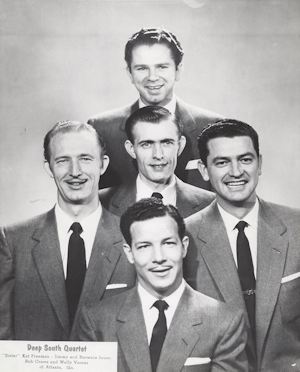 Top: Cat Freeman |
Group MembersTenor |
Deep South Quartet (1953-1956)
History
Bass singer Jimmy Jones formed the Deep South Quartet after a stint with the Rangers Quartet. Jones had initially traveled with the Rangers filling in for Arnold Hyles while Hyles was off the road recovering from an automobile accident in 1953. After Hyles returned, Jones continued a short while longer singing baritone for the Rangers. He then formed the Deep South Quartet in late 1953. The group was soon appearing on events promoted by Wally Fowler. From there, they'd go on to sing with many of the top groups of the mid-1950s including the Rebels, Florida Boys, Blackwood Brothers, and Statesmen.
The Deep South Quartet had considerable experience from the very beginning with Cat Freeman at tenor, Bob Crews singing lead, and flashy pianist Wally Varner. Freeman had sung tenor with several groups including both the Blackwood Brothers and the Statesmen prior to joining the Deep South Quartet. He would ultimately return to the Statesmen in 1957 after the death of Denver Crumpler. Crews had been the lead singer for the Harmoneers for roughly seven years prior to joining the Deep South. He only sang with the Deep South for a short period of time, ultimately resurfacing as the baritone and manager of the Harmoneers when that group reorganized in 1957. Varner had already made a name for himself with the Melody Masters Quartet and the Homeland Harmony Quartet by 1954. The Deep South line-up was completed by baritone Brownie Jones who was a brother of the group's manager, Jimmy Jones.
By the end of 1954, Freeman, Crews, and Varner had been replaced by tenor Kermit Jamerson and pianist/vocalist David Reece. Both Freeman and Varner joined the Revelaires Quartet after their brief stay with the Deep South Quartet. Nearly a decade after his experience singing with the Deep South Quartet, Jamerson sang with the Kingsmen Quartet.
The Deep South would undergo further changes over the next couple of years with future Cathedrals tenor Bobby Clark taking Jamerson's place and Tommy Rainer stepping into the lead singer role. An attempt to relocate north didn't work out, and the group disbanded in 1956 (or possibly early 1957). Jimmy Jones soon landed with the LeFevres where he sang both bass and baritone and sometimes dual bass with Rex Nelon.
Discography
45 and/or 78 Singles (all released on custom "Deep South Quartet" label)
1953 (DS 700): "When They Call My Name"/"Standing By The River"
1953 (DS 701): "Oh When I Meet You"/"In My Father's House"
1953 (DS 702): "Do Lord"/"Glad Reunion Day"
1954 (DS 703): "Great Gettin' Up Morning"/"At The End Of The Trail
1954 (DS 704): "Jesus Knows All About Me"/"Taller Than Trees"
1954 (DS 705): "I've Been With Jesus"/"Heavenly Love"
1956 (DS 706): "He's So Wonderful"/"I'll Lose My Blues In Heaven"
1956 (DS 707): "My Lord Is So Good To Me"/"Wondrous Word Of The Lord"
1956 (DS 708): "Angels In The Sky"/"I've Heard About A City
Unreleased 78 "Tell My Friends" (with the Melody Boys Quartet)
Full-Length Albums
Unreleased "Getting Ready To Leave This World; I Got Tired; I Want To Go To Heaven; He's So Wonderful; Hard Trials Will Soon Be Over; Glad Reunion Day; My Lord And I; Do Lord; I'll Lose My Blues In Heaven; Taller Than Trees; Heavenly Love; I've Been With Jesus (Kermit Jamerson, Tommy Rainer, Brownie Jones, Jimmy Jones, and Dickie Mathews).
